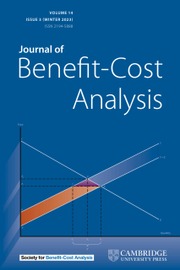Article contents
Is Mandatory Project Evaluation Always Appropriate? Dynamic Inconsistencies of Irreversible and Reversible Projects
Published online by Cambridge University Press: 19 January 2015
Abstract
Benefit-cost analysis (BCA) is used to optimize investment in public projects. Indeed, in many countries, BCA is mandatory for provision of most public services. However, once BCA is mandated, residents can strategically alter their behaviors based on a dynamic inconsistency that the BCA-based optimal service level depends on residents’ behaviors. This paper discusses this dynamic inconsistency problem, taking transportation services as an example. We show that the problem may decrease both social welfare and the utility of residents as compared with the first-best case, and that the occurrence of second-best outcomes depends on the reversibility of the project and the general-equilibrium interdependency with another project.
- Type
- Article
- Information
- Copyright
- Copyright © Society for Benefit-Cost Analysis 2012
References
- 3
- Cited by


